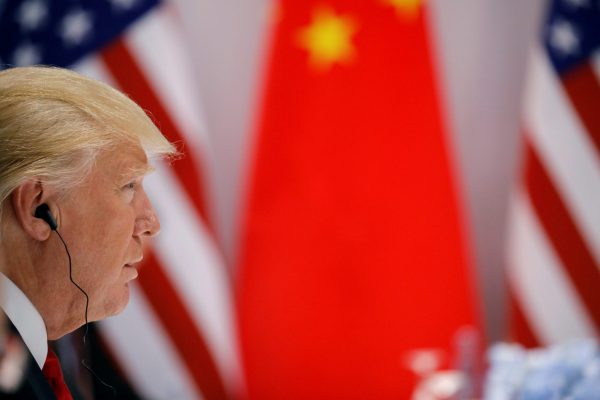The two sides are not openly quarrelling about dealing with North Korea under the United Nations framework. And the United States sent a delegation to China’s Belt and Road Forum in early May.
Trump’s decisions to dispatch US naval ships through the South China Sea and sell arms to Taiwan may seem to some observers to spell trouble. But those are in many ways routine moves and it would have been odd for the Trump administration not to have taken those steps.
The Trump team has quietly dropped naming China a currency manipulator. It has not levied a punitive import tariff on made-in-China products, as candidate Trump repeatedly promised. Those policies would have been controversial within the United States and beyond. Had the administration chosen to stay true to their word prior to assuming Trump’s formal position, on either account, there would have been few checks against those moves, certainly not from China.
Trade and investment are the single most tangible force in Sino–US engagement. Both Beijing and Washington, thus far, see it in their interests to keep their bilateral relationship on a stable and predictable path. Though there was no joint press conference after the recent Comprehensive Economic Dialogue between the two sides, being candid about differences is precisely what it takes to eventually reach agreements acceptable to both sides.
What happens next is much harder to predict.
Although some in China borrowed the ‘black swan’ analogy to describe Trump’s election victory, China did not experience the same level of social and cultural shock at his win as US and Western society more broadly. Familiarity with Hillary Clinton, Trump’s competitor, meant that Chinese expectations of smooth-sailing in the relationship after 2016 were low.
In hindsight, the Xi–Trump summit in Florida in early April 2017 injected a much-needed dose of stability to the relationship. The most significant outcome was the announcement of an agreement to manage differences in the relationship, including through restructuring the all-of-government ‘Strategic and Economic Dialogue’ into four more focused dialogues. The meeting bought much-needed breathing space.
As time has passed, it has become clear to China that on hard security issues, the geo-strategic establishment in Washington continues to be in charge regardless of who’s president.
The US military operates by its own calendar. Take the deployment of the Terminal High Altitude Area Defence (THAAD) anti-ballistic missile system in South Korea. The turmoil of South Korea’s presidential transition was no obstacle to its deployment since the system is owned and operated by the United States military. Never mind the simple fact that ordinary artillery fire is sufficient for North Korea to cause immense damage — and psychological chaos in the age of live television — to South Korea.
As for Trump’s overall security policy towards Asia, some Chinese observers wondered whether Trump would continue Obama’s ‘pivot’ or re-balancing strategy by another name. Judging by the messaging in Trump’s first formal trip abroad (to Saudi Arabia before heading on to a routine NATO meeting) and other gestures of reassurance to US allies, the question is closed. Continuity is the rule for Washington’s military involvement in Asia.
Trump has repeatedly lumped North Korea into his handling of the bilateral relationship with China. China is arguably to blame for letting itself be cast as having a singularly consequential role in Pyongyang. While Trump is betting on using North Korea to increase pressure on Beijing, his real goal is concessions from China and a change in North Korean behaviour may well be of secondary interest to him.
This tactic risks complicating security in the entire region. The North Korean regime is the only party that stands to benefit from the ongoing state of affairs — as it can afford to ignore either protests against its thumbing its nose at the international community or invitations to negotiate with it — and concentrate on developing its nuclear weapons and intercontinental missile programs. When South Korea and Japan are convinced that North Korea has crossed the threshold in developing its nuclear capacities, there is no guarantee that they will heed US advice to stay non-nuclear, assuming that to be the US preference. These outcomes risk Northeast Asian security stability.
Trump has undoubtedly let North Korean behaviour drive a wedge between Washington and Beijing. His team will have to find a creative way to climb down on that and it is unclear how much sympathy he can expect from China in the process.
Yet there remains a good deal of resilience in bilateral ties between China and the United States. The evolution of the relationship has always been eventful but also of its nature far from fatal.
Zha Daojiong is Professor of International Political Economy at the School of International Studies, Peking University.


The author fails to note that China has little reason to help contain N Korea because it gains from N Korea’s actions which keep the US from achieving hegemony in NE Asia. Also, the author did not note anything about things going on in the South China Sea: eg, China’s island building, etc. Nor its activities in the East China Sea.
I agree with your statements. From our (US) point of view, our pivot toward Asia is not gone – it’s only that Trump has no interest in cow-towing to China nor pouring billions of our dollars into areas that are ‘generally’ leaning toward China. We cannot be drawn into more ‘Vietnam’ type conflicts.
N. Korea is different: it’s threat to S. Korea and it’s disregard for any other country at all; it’s lack of humanity and it’s unstable, perhaps mentally-ill leader, makes action and attention more critical.